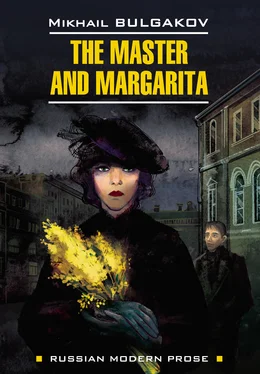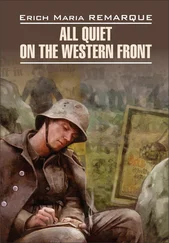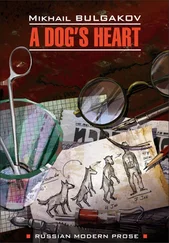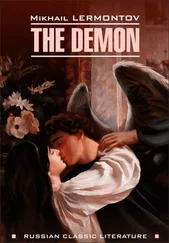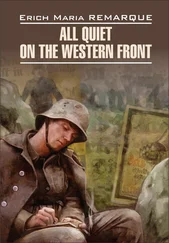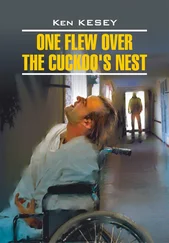Raising the dust to the sky, the ala burst into the lane, and last to ride past Pilate was a soldier with a trumpet that blazed in the sun behind his back.
Shielding himself from the dust with his hand, and with a discontented frown on his face, Pilate moved onwards, heading for the gates of the palace garden, and the legate, the secretary and the escort moved off after him.
It was about ten o’clock in the morning.
Yes, it was about ten o’clock in the morning, illustrious Ivan Nikolayevich,” said the Professor.
The poet passed his hand across his face like a man who has just come to, and saw that it was evening at Patriarch’s.
The water in the pond had blackened, and a light skiff was already sliding across it, and the splashing of an oar and the giggles of some citizeness in the skiff could be heard. People had appeared on the benches in the avenues, but again, on each ofthe three sides of the square apart from the one where our interlocutors were.
It was as if the sky above Moscow had faded, and the full moon could be seen perfectly distinctly on high, not yet golden, but white. Breathing had become much easier, and the voices beneath the lime trees now sounded softer, suited to the evening.
“How on earth did I fail to notice he’d managed to spin an entire story?” thought Bezdomny in amazement. “I mean, it’s already evening now! Yet perhaps it wasn’t even him telling it, simply I fell asleep and dreamt it all?”
But it must be supposed that it was, after all, the Professor who had been telling it, otherwise it would have to be allowed that Berlioz had had the same dream too, because the latter, peering attentively into the foreigner’s face, said:
“Your story is extremely interesting, Professor, although it doesn’t coincide at all with the stories in the Gospels [118] the stories in the Gospels – Евангельские рассказы
.”
“Pardon me,” responded the Professor with a condescending smile, “but you of all people ought to know that absolutely nothing of what is written in the Gospels ever actually happened, and if we start referring to the Gospels as a historical source [119] to refer to the Gospels as a historical source – ссылаться на Евангелие как на исторический источник
…” Again he smiled, and Berlioz was taken aback [120] to be taken aback – быть захваченным врасплох
, because he had been saying word for word the same thing to Bezdomny while walking along Bronnaya towards Patriarch’s Ponds.
“That is so,” replied Berlioz, “but I’m afraid no one can confirm that what you’ve told us actually happened either.”
“Oh no! One can confirm it!” responded the Professor with extreme confidence, beginning to speak in broken Russian, and in an unexpectedly mysterious way he beckoned the two friends a little closer towards him.
They leant in towards him from both sides, and he said, but now without any accent (which, the devil knows why, was forever coming and going):
“The fact is…” – here the Professor looked around fearfully and began speaking in a whisper – "I was personally present during it all. I was on Pontius Pilate’s balcony, and in the garden when he was talking with Caipha, and on the platform – only secretly, incognito, so to speak, so I beg you – not a word to anyone, and in absolute confidence!. Ssh!”
Silence fell, and Berlioz turned pale.
"How. how long have you been in Moscow?” he asked in a faltering voice [121] in a faltering voice – дрогнувшим голосом
.
"I’ve only just this moment arrived in Moscow,” replied the Professor, perplexed, and only at this point did the friends think to look properly into his eyes, and they satisfied themselves that the left, the green one, was completely mad, while the right one was empty, black and dead.
"And there’s everything explained for you!” thought Berlioz in confusion. "There’s an insane German come here, or else he’s just gone barmy at Patriarch’s. There’s a thing!”
Yes, everything was, indeed, explained: the very strange breakfast with the late philosopher, Kant, and the ridiculous talk about sunflower oil and Annushka, and the predictions about his head being chopped off, and all the rest – the Professor was insane.
Berlioz immediately grasped what was to be done. Reclining against the back of the bench, he started winking at [122] to wink at – заговорщицки подмигивать
Bezdomny behind the Professor’s back – as if to say, don’t contradict him – but the bewildered poet failed to understand these signals.
“Yes, yes, yes,” said Berlioz excitedly. “Actually, it’s all possible!. Perfectly possible, even – Pontius Pilate, the balcony and so forth. And are you here alone or with your wife?”
'Alone, alone, I’m always alone,” replied the Professor bitterly.
“But where are your things, Professor?” asked Berlioz, fishing. “At the Metropole? Where have you put up?”
“Me? Nowhere,” replied the crazy German, with his green eye wandering mournfully and wildly over Patriarch’s Ponds.
“How’s that? But. where are you going to be staying?”
“In your apartment,” the madman suddenly replied in an overfamiliar tone, and gave a wink.
“I. I’m delighted,” mumbled Berlioz, “but truly, you’ll find my place inconvenient. And there are wonderful rooms at the Metropole – it’s a first-class hotel…”
“And is there no Devil either?” the sick man cheerfully enquired all of a sudden of Ivan Nikolayevich.
“The Devil too.”
“Don’t contradict him!” Berlioz whispered with his lips alone as he slumped down [123] to slump down – падать, обрушиваться
behind the Professor’s back, grimacing.
“There is no Devil!” Ivan Nikolayevich exclaimed something unnecessary, bewildered by all this nonsense. “What a pain! Just stop behaving like a madman!”
At this point the madman burst into such laughter that a sparrow flitted out from the lime tree above the heads of the seated men.
“Well, now that is positively interesting,” said the Professor, shaking with laughter. “What is it with you? Whatever you try, nothing exists!” He suddenly stopped chuckling and, as is quite understandable in a case of mental illness, after the laughter he went to the other extreme – became irritated and cried out sternly: “So, there really isn’t one, then?”
“Relax, relax, relax, Professor,” muttered Berlioz, fearful of agitating the sick man, “you sit here for a minute with Comrade Bezdomny, and I’ll just run down to the corner, make a telephone call, and then we’ll see you to wherever you like. After all, you don’t know the city…”
Berlioz’s plan has to be acknowledged as the correct one: he needed to run to the nearest public telephone and inform the Foreigners’ Bureau of the fact that there was a visiting consultant from abroad sitting at Patriarch’s Ponds in an obvious state of madness. So it was essential to take measures, or else the result would be some kind of unpleasant nonsense.
“Make a telephone call? Well, all right, make a call,” the sick man consented sadly, then suddenly made a passionate request: “But I implore you in farewell, do at least believe that the Devil exists! I really don’t ask anything greater of you. Bear in mind that for this there exists the seventh proof, and the most reliable one, too! And it will now be put before you.”
“Very well, very well,” said Berlioz in a tone of feigned friendliness [124] in a tone of feigned friendliness – фальшиво-ласковым тоном
; and, with a wink to the disconcerted poet, who did not at all fancy the idea of guarding the mad German, he headed for the exit from Patriarch’s on the corner of Bronnaya and Yermolayevsky Lane.
Читать дальше
